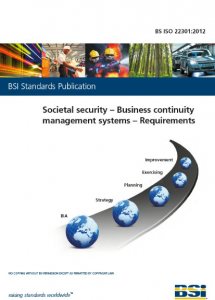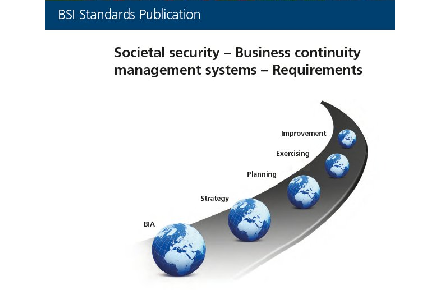BS ISO 22301:2012
Societal security. Business continuity management systems. Requirements
Introducing the latest international requirements standard for business continuity management, BS ISO 22301 specifies the requirements for setting up and managing an effective Business Continuity Management System (BCMS) for any organization, regardless of type or size.
 Business continuity contributes to the development of a more resilient society. Organizations without an effective BCMS in place risk significant vulnerability and the resulting impact on their employees, customers and suppliers. BS ISO 22301 gives your organization access to the requirements of a BCMS that will enable your organization to prepare for disruptive incidents that might otherwise prevent you from achieving your objectives.
Business continuity contributes to the development of a more resilient society. Organizations without an effective BCMS in place risk significant vulnerability and the resulting impact on their employees, customers and suppliers. BS ISO 22301 gives your organization access to the requirements of a BCMS that will enable your organization to prepare for disruptive incidents that might otherwise prevent you from achieving your objectives.
The standard can be used to assess an organization’s ability to meet its own continuity needs and obligations and establish a business continuity management policy that provides a framework for implementing effective business continuity arrangements.
Gain complete confidence
In common with other management systems’ standards, BS ISO 22301 is based on the ‘Plan-Do-Check-Act’ model that seeks to improve continually the effectiveness of the organization through proficient planning, implementation, supervision, review and maintenance.
The BS ISO 22301 specifies the requirements to:
- Identify crucial risk factors already affecting your organization
- Understand your organization’s needs and obligations
- Establish implement and maintain your BCMS
- Measure your organization’s overall capability to manage disruptive incidents
- Guarantee conformity with stated business continuity policy
You asked… BSI delivered
BS ISO 22301 follows the strong international interest in the original British Standard BS 25999-2in the UK and around the globe. As with all international standards, achieving certification means recognition globally.
“In the last 12 months, 81% of managers with BCM in place agreed that it successfully reduced disruption and was worth the cost due to the benefits that it brought to their organization” – ‘Planning for the worst’ CMI Business Continuity Management Survey, March 2012
Protect your staff and your reputation
If disruption is not an option for your business, implementing BS ISO 22301 allows you to develop a best practice approach. The standard has been specifically designed to ensure continued business functionality during the most unexpected circumstances.
What does BS ISO 22301 include?
Introduction
0.1 General
0.2 The Plan-Do-Check-Act (PDCA) model
0.3 Components of PDCA in this International Standard
1 Scope
2 Normative references
3 Terms and definitions
4 Context of the organization
4.1 Understanding of the organization and its context
4.2 Understanding the needs and expectations of interested parties
4.3 Determining the scope of the management system
4.4 Business continuity management system
5 Leadership
5.1 General
5.2 Management commitment
5.3 Policy
5.4 Organizational roles, responsibilities and authorities
6 Planning
6.1 Actions to address risks and opportunities
6.2 Business continuity objectives and plans to achieve them
7 Support
7.1 Resources.
7.2 Competence
7.3 Awareness
7.4 Communication
7.5 Documented information
8 Operation
8.1 Operational planning and control
8.2 Business impact analysis and risk assessment
8.3 Business continuity strategy
8.4 Establish and implement business continuity procedures
8.5 Exercising and testing
9 Performance evaluation
9.1 Monitoring, measurement, analysis and evaluation
9.2 Internal audit
9.3 Management review
10 Improvement
10.1 Nonconformity and corrective action
10.2 Continual improvement
Bibliography
.





